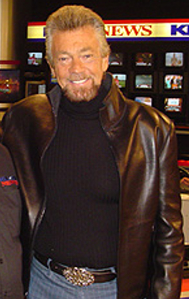Stephen Cannell
| Stephen J. Cannell | |
|---|---|

Cannell in 2005
|
|
| Born |
Stephen Joseph Cannell February 5, 1941 Los Angeles, California, U.S. |
| Died | September 30, 2010 (aged 69) Pasadena, California, U.S. |
| Cause of death | Melanoma |
| Resting place | Forest Lawn Memorial Park (Hollywood Hills) |
| Nationality | American |
| Education | University of Oregon |
| Occupation | Writer, producer, director |
| Years active | 1968–2010 |
| Known for | Founder of The Cannell Studios |
| Spouse(s) | Marcia Cannell (m. 1964–2010) |
| Children | 4, including Tawnia |
| Awards | Emmy Award |
| Website | www.cannell.com |
Stephen Joseph Cannell (/ˈkænəl/; February 5, 1941 – September 30, 2010) was an American television producer, writer, novelist, and occasional actor, and the founder of Cannell Entertainment (formerly Stephen J. Cannell Productions) and the Cannell Studios.
After starting his career as a television script writer, Cannell created or co-created several dozen successful TV series from the 1970s to the 1990s, often with his creative partner Frank Lupo. Cannell's creations included The Rockford Files, The A-Team, The Greatest American Hero, 21 Jump Street, and The Commish. He also wrote novels, notably the Shane Scully mystery series.
Cannell was born in Los Angeles, California, and raised in nearby Pasadena. He was the son of Carolyn (née Baker) and Joseph Knapp Cannell. Joseph owned the highly successful interior decorating company Cannell and Chaffin. Cannell struggled with dyslexia in school, but did graduate from the University of Oregon in 1964 with a bachelor of science degree in journalism. At UO, he joined the Sigma Chi fraternity.
After college, Cannell spent four years working with the family business before selling his first script to the Universal series It Takes a Thief in 1968. He was quickly hired by the television production branch of Universal Studios and was soon freelance writing for such other crime shows as Ironside and Columbo. Not long afterward, he received a telephone call from friend Herman Saunders who was the producer on the series Adam-12. They needed a script right away. Would Stephen be interested in writing it? He delivered what they wanted in one day, his first full-time gig, and was soon hired as story editor of Jack Webb's police series Adam-12, then in its fourth season (1971–1972).
...
Wikipedia
